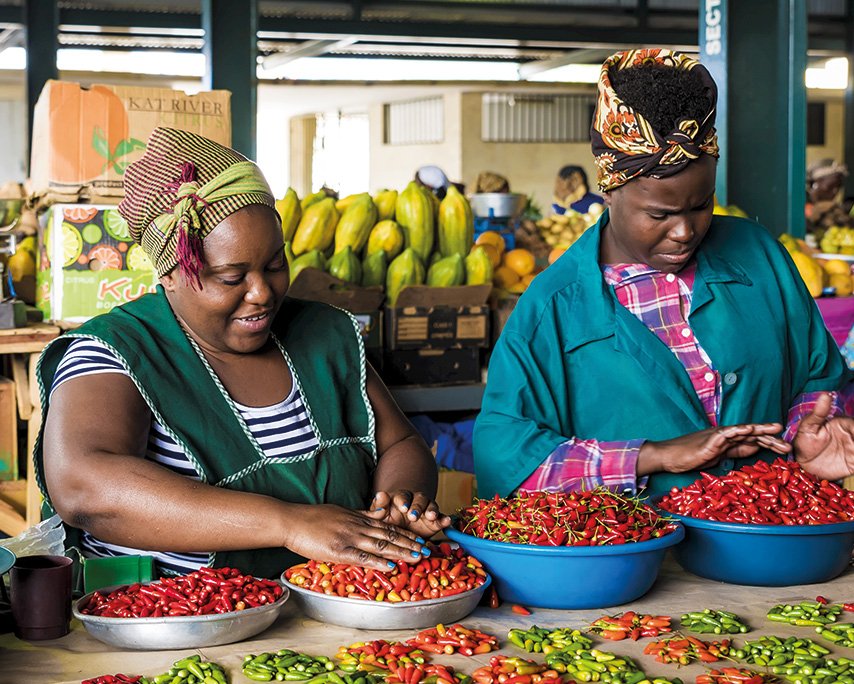Two women selling chillis in Maputo Central Market, Mozambique.
Photo Credit: Dosfotos/Design Pics Editorial/Universal Images Group via Getty Images
Empowering women through effective reporting
In an interconnected world, the need to document and publish social impact activities and solutions and how this shapes perceptions and drives change cannot be overstated. Particularly in the realm of women’s issues, the influence of reporting to foster inclusivity, promote gender equality and highlight violations of women’s rights is prevalent. However, effective reporting on these matters requires careful consideration of various aspects to ensure accuracy, sensitivity and impact.
Understanding dynamics of identities
One of the fundamental principles in reporting on women’s issues is recognising the dynamics of identities. Women come from diverse backgrounds, encompassing race, ethnicity, religion, sexual orientation and socioeconomic status. Publications must reflect this diversity and avoid presenting a monolithic view of women’s experiences. By acknowledging intersectionality, organisations reporting on women’s issues ensure the voices and experiences of all women are heard and represented accurately.
Centering women’s voices
Inclusive reporting prioritises the voices and perspectives of women themselves. Too often, stories about women are told through the male lens or filtered through a patriarchal perspective. To counteract this, organisations should actively seek out women as sources and experts, amplifying their voices and allowing them to tell their own stories. This provides a more authentic portrayal and empowers women to participate in public discourse and decision-making processes. Further, training and educating male storytellers on how to report women’s issues enables them to effectively capture and publish accurate representations of women in the communities they serve.
Sensitivity and respect
Reporting on issues such as gender-based violence, reproductive rights, or discrimination requires a high level of sensitivity and respect for the subjects involved. Any publisher must be mindful of the potential trauma or re-traumatisation survivors may experience when sharing their stories. Consent and confidentiality must be prioritised, and care should be taken to avoid exploiting sensitive topics for the sake of sensationalism.
Holding power accountable
A critical aspect of effective reporting on women’s issues is holding power structures and institutions accountable for their actions and policies. This includes exposing instances of gender-based discrimination, violence or systemic inequality, whether they occur in government, corporations, educational institutions, not-for-profit organisations and other spheres of society. By shining a light on these injustices, publishers play a vital role in advocating for change and advancing gender equality.
Education and awareness
In addition to reporting on specific issues, individuals charged with the responsibility to communicate women’s and girls’ issues have a responsibility to educate and raise awareness among the public about the broader context of women’s rights and gender equality. This includes providing accurate information about relevant laws, policies and initiatives, and debunking myths and misconceptions that perpetuate gender stereotypes and discrimination. Quality reporting helps mobilise support for women’s empowerment efforts and catalyse social change.
Enhancing reporting on international days related to women
International days such as International Women’s Day or International Day for the Elimination of Violence against Women provide important opportunities to raise awareness and mobilise action on women’s rights issues. To make communication on these occasions more effective, organisations must:
- Collaborate with grassroots organisations and activists working directly on women’s issues to ensure their reporting is grounded in the realities of women’s lives.
- Use multimedia approaches, including video interviews, podcasts and social media campaigns, to reach diverse audiences and engage with younger generations.
- Provide resources and toolkits for storytellers, including background information, expert contacts and story ideas, to facilitate accurate and impactful reporting.
- Incorporate diverse perspectives and voices into coverage, including those of marginalised women and communities whose experiences are often overlooked.
- Monitor and evaluate the impact of reporting efforts to assess reach, engagement, and effectiveness in raising awareness and driving action on women’s rights issues.
Effective reporting on women’s issues is essential for advancing inclusivity, promoting gender equality and advancing human rights. By following key principles such as understanding intersectionality, centering women’s voices, exercising sensitivity and respect, holding power accountable, and promoting education and awareness, the communication experts reporting within their organisations contribute to meaningful change and empower women worldwide.



